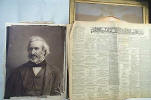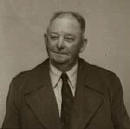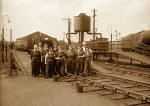|
Questions |
|
Below, are some questions I have not been able to answer. If you can help me to answer any of these questions, please e-mail me. Please click on the links below, or scroll down this page. |
|
Ayton - Rugby Photograph |
|
Alex Ayton's photographed the England and Scotland rugby teams playing at Inverleith, Edinburgh, on 19 Mar 1910. |
|
QUESTION: Where can I get a good copy of this photo? |
|
Asked by: Chris F Newby-Robson |
|
John Counsell |
|
John Counsell was a photographer in Brighton, then Edinburgh. He later moved to Cornwall, and took up photography there under the name of John Counsell Stephens. |
|
QUESTION: Why did John Counsell change to using the name John Counsell Stephens? |
|
Asked by: David Simkin and Deirdre Long |
|
Alan Daiches |
|
Alan Daiches has lectured to Edinburgh Photographic Society in 1966 and has exhibited his work in EPS Exhibitions. Jennifer Toleikis hopes to use some of Alan Daiches photographs, believed to be held at the Getty Museum in Los Angeles, in a book on the artist Allan Kaprow. But first she needs to obtain copyright permission to do so. |
|
QUESTION: Does anybody know how to contact Alan Daiches, or the person who currently holds the copyright to his work? REPLY: Many thanks to Liz Kettle (brother of Alan Daiches) for contacting me - July 2003 |
|
Asked by: Jennifer Toleikis |
|
John Edmonstone - Bird Stuffer |
||
|
John Edmonstone was a bird-stuffer who shared premises with the early Edinburgh photographer, James Howie, in the 1830s. I have been told that he was a freed Guyanan slave, and that he taught Charles Darwin taxidermy. |
||
|
QUESTION Does anybody have a photograph of John Edmonstone, or any further information about John Edmonstone? |
||
|
ANSWER 1 Since I first asked this question, probably about 3 years ago, I have just had one response. It comes from Janet Baker, Wakefield, West Yorkshire, England. Janet writes:
|
||
|
ANSWER 2 Janet wrote, 3 days later, with an update:
|
||
|
ANSWER 3 My search on the Internet about 3 years ago found very little, but today (Feb 22, 2006) a search for "JOHN EDMONTON" EDINBURGH on Google has produced far more. This seems to be mainly because John Edmonton appeared in a list of '100 Great Black Britons' compiled by Patrick Vernon in 2004. Here are a couple of extracts from these web sites:
|
||
|
Asked by Fraser MacLean |
|
A W Elson - Carbon Photographs |
|
I have received several emails from people who have large carbon photographs by A W Elson of Boston. Here are further details and some examples of Elson's work |
|
QUESTION: Can anybody tell me more about the history of A W Elson and the photographs that it produced. This would enable me to give a fuller answer to any future questions that I receive. |
|
I have received many emails on the work of A W Elson, Boston. |
|
Empire Studio - Open when? |
|
The address, 92-96 Nicolson Street, appears on the back of some Empire Studio photos. Several photographers were based at this address, from 1897 until 1945, usually operating under their own names. |
|
QUESTION: When was 92-96 Nicolson Street the address of Empire Studio? |
|
Asked by: Jenna Robertson |
|
FGOS |
|
I have received an e-mail from somebody who has some prints by: - GWW = George Washington Wilson (Aberdeen) - JV = James Valentine (Dundee) and - FGOS - Who was he? |
|
QUESTION Who was FGOS? |
|
ANSWER He was Francis Godolphin Osborne Stuart, a London photographer, 1881-82. |
|
ANSWER (continued) Francis Godolphin Osborne Stuart was: - started work as a carpenter and camera maker in Aberdeen - became a professional portrait and landscape photographer - spent some time in London (1881-82) - established a home and studio in Southampton (by 1883). - began publishing postcard pictures in 1901and covered much of (mainly southern) Hampshire and adjoining counties, as well as shipping and London. The family business was continued under his name into the 1930's. His postcard pictures are still keenly collected. [With acknowledgement to Mike Pettigrew for the above details. Most of the information has been taken from a booklet of FGOS' picture postcard reproductions (of Southampton), published by Ensign Publications.] |
|
Asked by: Heather |
|
A Healey Hislop |
|
A Healey Hislop gave a criticism of the Edinburgh Photographic Society Exhibition in December 1924 and gave a lecture to the society in November 1925, entitled: Principles of Photography with a Pinhole Camera Roger Bloomfield tells me that he has been looking at some etchings by A Healey Hislop of Paris and other places, including Gothic interiors, and would like to learn more about him. |
|
QUESTION: Do you have any information about A Healey Hislop or his work? |
|
Asked by: Roger Bloomfield |
|
ANSWER: Peter Casey tells me that he has a railway poster produced for the London Midland & Scottish Railway Company, not sure of the year this was produced but the image is signed by Healey Hislop. Could this be one and the same person Roger Bloomfield refers to? The image is a street scene with Edinburgh Castle in the background and in the foreground a sign reads Royal Scottish Academy Exhibition. Please click on the image above to enlarge it. Please e-mail me if you have any further comments. Thank you. |
|
Reply received from Peter Casey |
|
Charles Kinnear and T Melville Raven |
|
Charles Kinnear toured France and Spain. T Melville Raven toured France; both in the mid-19th century. They took photographs that were displayed in Edinburgh exhibitions. |
|
QUESTION: Does anybody know where any of these photos taken by Kinnear and Raven are now? |
|
Asked by: John Hannavy |
|
Louis Saul Langifer - Early Days |
|
Louis Saul Langfier had a studio in Glasgow before Edinburgh. |
|
QUESTION 1: Where was he before Glasgow? QUESTION 2: Was he related to Adolph Langfier, who had a studio in Harrogate? |
|
Asked by: Frances Rive |
|
ANSWER 1 and 2: Louis Saul Langfier and Adolph Langfier were brothers. Both came from Poland to Britain. The date that they came to Britain is not known. Did they come directly to Glasgow? |
|
Answered by Doreen D Brady, New Jersey USA, granddaughter of Louis Saul Langfier |
|
John Moffat |
||
|
||
|
QUESTION: Does anybody recognise this sitter? |
||
|
Asked by: Brian Smith |
|
Photographic Convention of the UK |
||
|
||
|
QUESTION 1: When was the Medal issued? QUESTION 2: Were Medals issued at Conventions? |
||
|
Asked by Robert Griffin |
|
Photographic Medals |
|
David Likar lives in Australia and collects photographic medals. He is researching Royal Photographic Society Medals up to 1914. He also has two FAPA Scottish Medals awarded to Robert Sinclair |
|
QUESTION 1: Does anybody own any of these medals. If so would they be willing to answer questions about them. QUESTION 2: What is FAPA? |
|
Asked by David Likar |
|
Railway Worker and Photographer |
||
|
||
|
QUESTION 1: Who is the person in the photograph above who took the photo below and many similar railway photos? |
||
|
Asked by Archie Foley |
|
Robert W Reid |
|
Robert W Reid took some photographs of animals in this Highlands of Scotland. Some can be found on this web an Old Scotland web site. |
|
QUESTION: Does anybody know anything about this photographer? My e-mail correspondent has 144 of Robert Reid's photographs, and has been trying to trace Robert Reid for the past 25 years! |
|
Asked by Dennis Thompson |
|
Frederick George Sykes |
|
Frederick George Sykes was a Senior Police Officer in Edinburgh between 1930 and 1950. He was a Member of Edinburgh Photographic Society for five years, and an exhibitor in Open Exhibitions. |
|
QUESTION: Does anybody have a photograph of Frederick George Sykes, or know any information about him? |
|
Asked by George Taylor |
|
Valentine & Co - Snapshot Booklets |
|
Valentine & Co have published many small "Valentine Snapshots" booklets, showing views, particularly of Scotland. |
|
QUESTION 1: When were these booklets produced? QUESTION 2. What was the original price of these booklets? QUESTION 3: Which areas were covered by these booklets? |
|
Asked by: Lisa Unsworth |
|
Photos and Questions |




